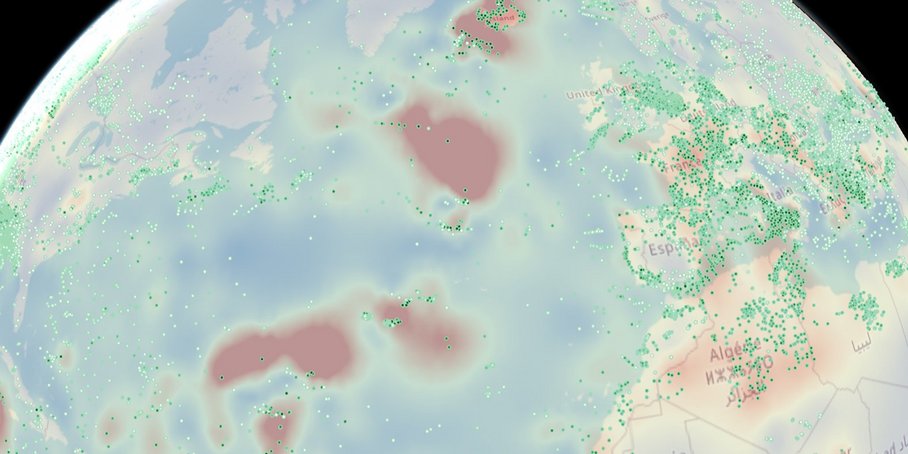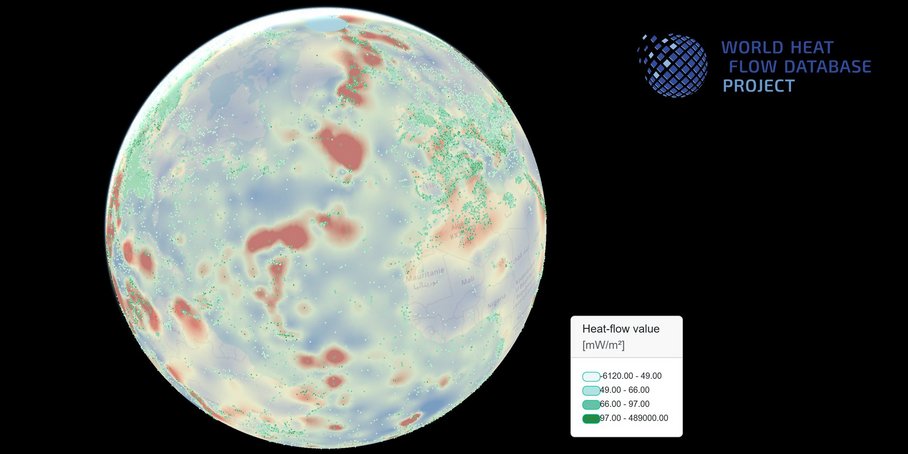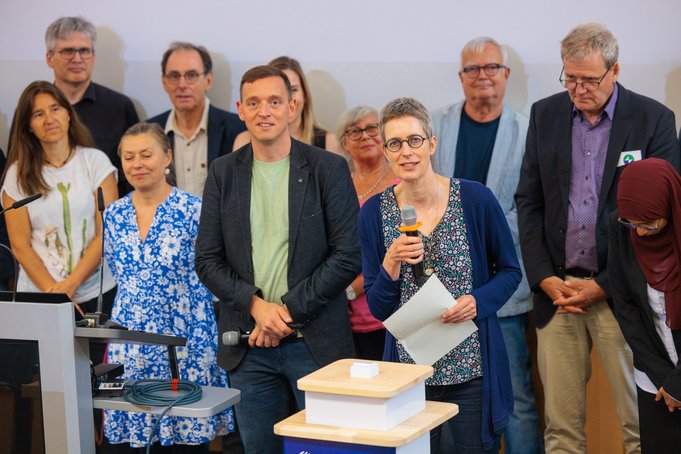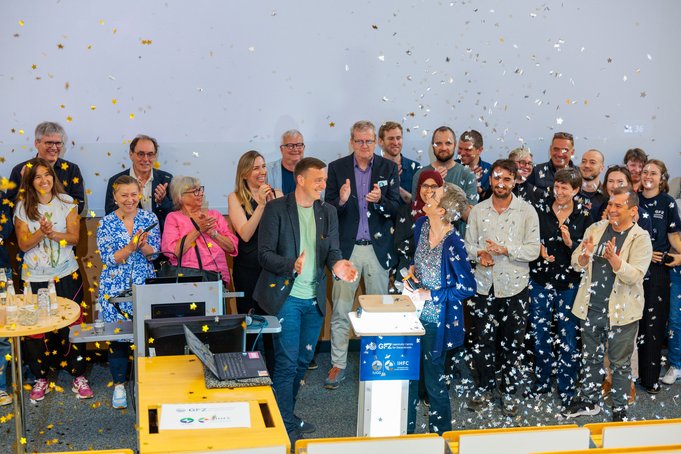Summary
The GFZ Helmholtz Centre for Geosciences and the International Heat Flow Commission (IHFC) officially launched heatflow.world, a new global portal for terrestrial heat flow data. It provides access to the most comprehensive scientifically validated global heat flow dataset to date, comprising over 100,000 data points and a wide range of metadata.
Data on heat flow from the Earth's interior provide fundamental insights into the geodynamic and tectonic evolution of the Earth's crust and form the basis for the assessment of renewable geothermal resources.
The opening event for the new portal, attended by over 110 guests and streamed internationally, took place on 8 July at GFZ’s Telegrafenberg campus and marked a significant milestone in the development of open and quality-assured Earth science data and community infrastructure.
Prof. Susanne Buiter, Scientific Executive Director of GFZ, officially launched the portal:
“Global data infrastructures like heatflow.world are at the heart of modern Earth science.They allow ground-truthing, feed models, and enable new discoveries. For this, broad community participation and long-term data reusability is essential. GFZ is proud to host and support this platform in service of the international geoscience community.”
Background: Importance of high-quality and harmonised heat flow data
Heat flow is one of the few physical observables that provides direct insight into the deep thermal structure of the Earth. It is a key parameter in disciplines such as geodynamics, geothermal energy research, tectonics, and paleoclimate studies.
Heat flow data is obtained by measuring the temperature and thermal conductivity of rock, both on land, for example in geothermal drilling, and in oceanographic surveys using probes from the sea floor.
Until now, inconsistent standards and fragmented legacy datasets have limited global access to harmonised and quality-controlled heat flow data.
The new platform: a research infrastructure
The new platform, developed at the GFZ in collaboration with the TU Dresden and numerous international partners, now provides the most comprehensive, scientifically validated global heat flow dataset to date, which is fully aligned with the FAIR principles (Findable, Accessible, Interoperable, Reusable). It enables researchers to search, filter, and assess over 100,000 heat flow data points, including rich metadata, research histories, and a novel quality scoring system.
“The portal is more than just a database. It's a research infrastructure designed to connect disciplines and generations of scientific work,” says Dr. Sven Fuchs, Principal Investigator of the project at GFZ, Vice Chair of the IHFC, and Leader of Task Force 8 on Lithospheric Heat Flow under the International Lithosphere Program (ILP).
Phase 1 successfully completed: Five-Year Reassessment of the Global Heat Flow Landscape
The launch crowns the achievements of the voluntary contributions of the IHFC Global Heat Flow Data Assessment project, which was significantly supported by Project Innerspace, and of the World Heat Flow Database Project (WHDB), funded by the German Research Foundation (DFG). Between 2022 and 2025, the WHDB project, led by GFZ in partnership with TU Dresden, aimed at systematically reassessing the fragmented and inconsistently digitized landscape of global heat flow data — which, despite its importance, had seen little structural updating in recent decades.
Key achievements of this five-year phase include the following:
- The Global Heat Flow Database more than doubled in size to over 100,000 entries.
- The team tripled the number of scientific publications referenced to almost 2000, many of them previously unknown or inaccessible.
- A multi-dimensional quality assessment system was established that allows users to filter data based on methodological reliability, numerical uncertainty, and perturbing effects.
- The selection of use-case-specific data, metadata coverage, and completeness were significantly improved, which benefits the reproducibility of geodynamic, geothermal, and paleoclimate studies.
- International collaboration enabled the establishment and expansion of a structured community assessment framework, supported by online workshops and a dedicated fellowship program.
In practice, this means that researchers can now trace overlapping measurements taken at the same site, identify the correction models applied, and assess the scientific reliability of each data point. One direct result of this is that, in regional reassessments such as those conducted in Germany, researchers discovered that the subsurface may hold significantly more thermal energy than previously thought. This information is valuable for both scientific research and sustainable energy planning.
Phase 2 at the start: Toward a Comprehensive Earth Heat Budget
Building on the momentum of this achievement, the project is entering its second phase (the Global Heat Flow Portal Project; 2025-2028), which is also funded by the DFG. In this phase, which again involves GFZ, TU Dresden and is now also supported by the University of Bremen/MARUM, we aim to finalise the global data assessment and enhance the capabilities of the heat-flow portal, including:
- integration of subsurface temperature and thermal property datasets,
- extended analysis and integration of unpublished marine heat flow data,
- inclusion of model-derived thermal constraints, and
- development and integration of expanded tools for uncertainty quantification and quality tracking.
This next step will not only complete the global assessment effort initiated at the 2019 General Assembly of the International Union of Geodesy and Geophysics (IUGG) in Montreal, but also establish heatflow.world as a long-term backbone infrastructure for the IHFC and the international Earth science community.
The Opening Ceremony: A Vision for Open, Global, Data-Driven Science
The launch event featured contributions from leading disciplinary scientists, including Prof. Tilman Spohn (DLR Institute Berlin), Dr. Ivone Jiménez-Munt (GEO3BCN-CSIC, Barcelona), and senior representatives from GFZ and IUGG. The event emphasized the importance of transparent, curated data for both planetary and Earth system research. As heat flow data is a crucial yet frequently underutilized parameter, the portal created new opportunities for multidisciplinary collaboration and digital research workflows.
More Than Just a Database
Regional reassessments, such as those in Germany, have already revealed significantly greater geothermal potential than was previously estimated [Link], demonstrating how quality-controlled heat flow data can impact applied science and national energy strategies. heatflow.world is a comprehensive community platform that enables researchers and decision-makers to inform models, reduce uncertainty, and connect scientific and societal goals.
The Global Heat Flow Data Portal is now live at https://portal.heatflow.world/.
- International Heat Flow Commission (IHFC): www.ihfc-iugg.org
- World Heat Flow Database Project (phase one): GFZ project site
- World Heat Flow Portal Project (phase two): GFZ project site




